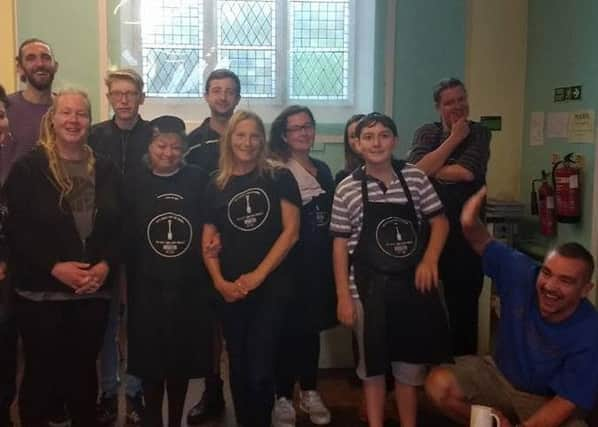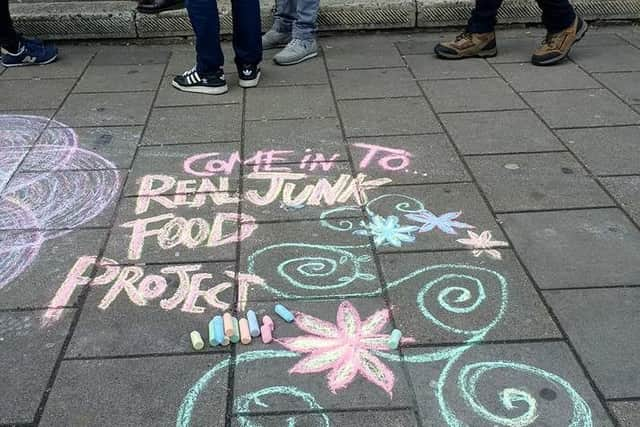The Real Junk Food Project Brighton - a cafe at the heart of a community


“They have flown half-way round the world only to end up in a bin in Brighton.”
The sumptuous berries, I discover, had been rejected by supermarkets simply because of a sticky mark on the packaging.
Advertisement
Hide AdAdvertisement
Hide AdSelf-professed green activist, mother and, as I observed, blueberry enthusiast, Sarah Betts works alongside project organiser Adam Buckingham as a director of The Real Junk Food Project Brighton.
Their mutual mission is to intercept food waste and use it to serve up dishes to the local community on a pay-as-you-feel basis.
Adam, a fine arts graduate and former chef, is running late due to a mis-timed delivery but is expected to arrive for lunchtime service.
In the meantime, as I continue to chat to Sarah, her enthusiasm and dedication to the project become contagious.
Advertisement
Hide AdAdvertisement
Hide AdStarting as a volunteer when the project began in 2014, Sarah found it ‘ticked so many boxes’ that she jumped at the chance to later become a director.


For Sarah, the focus is 50/50 between the environmental issue of food waste and the culture the project creates.
“I definitely have respect for how much of the earth’s energy and resources have gone into a single packet of blueberries.”
The close community created here is the delicious cherry on top – a cherry they no doubt rescued from a dire fate.
Advertisement
Hide AdAdvertisement
Hide Ad“There are not many places where you will see the mayor, businessmen, students and the socially disadvantaged all coming alongside one another to share a meal,” says Adam who has arrived after diverting the delivery crisis.


“For many in the city centre, Friday has become junk food day.”
The inspiration behind this community cafe in Brighton actually came from another Adam – Adam Smith, a founder and co-director of global initiative, The Real Junk Food Project.
Born and raised in Leeds, and a professional chef for more than ten years, Adam Smith had been working in restaurants and on farms in Australia when he noticed the scale of wastage in both the catering and agricultural industries.
Advertisement
Hide AdAdvertisement
Hide AdHe was unable to reconcile the amount of wasted food with the number of malnourished people in the world.
A leader on the farm said: “Adam, you can’t change the world unless you change your home town first.”
So, using a pay-as-you-feel model he had seen in Melbourne called Lentil as Anything, he returned home to Leeds intent on making an impact.
And quite an impact he has made.
Since setting up the first cafe in Armley three years ago things have really taken off. Through word-of-mouth and social networking, there are now 125 Real Junk Food cafes worldwide, including Australia, Israel and of course, Brighton with America next to join the crew.
Advertisement
Hide AdAdvertisement
Hide AdBrightonian Adam heard about the project online when he came across a video of Adam Smith intercepting food waste from various locations around Leeds.
“Something resonated with me”, Adam recalls, and he sent a message thanking the project for all they were doing.
He didn’t expect to receive a response telling him to start up his own project; a response that would eventually culminate in him quitting his job as a security guard and focusing full time on his own branch of the global network.
It was a slow process finding investment, space, food and volunteers – Adam was on benefits for a year-and-a-half, and even now things remain tight.
Advertisement
Hide AdAdvertisement
Hide AdRegular volunteer Jacqui Loton tells me the pay-as-you-feel concept does not see a lot of money being given and they do struggle to cover costs.
“There are hidden costs,” she says.
“Many people assume they are doing a service eating food that would otherwise be thrown away but there are costs involved in bringing that food to the table, such as rent, fuel, van maintenance.”
Costs are subsidised by running a private catering company alongside the project.
The team’s first paid gig meant borrowing a cafe’s kitchen after hours and wheeling food across to a warehouse, using a small marquee and heat lamps to cater a theatre event at Circus Street for more than 200 people.
Advertisement
Hide AdAdvertisement
Hide AdHowever, with publicity spreading through word-of-mouth and demand for their services growing, they have become adept at catering events, from yoga retreats to weddings.
There are now cafes running over three locations in Brighton, five days a week with 120 volunteers on the books and hundreds of people showing up to enjoy the fine fare.
“We do get a lot of regulars, a lot of elderly people come in because they enjoy the restaurant-type atmosphere without the unaffordable prices”, Jacqui tells me.
Despite the love of it all, and indeed the success, the concept is actually designed to put itself out of business.
Advertisement
Hide AdAdvertisement
Hide AdUltimately the desire is not to still be facilitating food waste in ten or 20 years and the next priority is education.
At a TED Talk in Warwick in 2015, Adam Smith said: “We want to be teaching the next generation of children to grow up and not rely on food banks and not depend on pay-as-you-feel cafes, to understand where food comes from.”
The local team also has big aspirations.
They hope to buy their own space one day to run a seven-day-a-week cafe and community space. The aim is to maintain community and run workshops to educate people about food and food waste.
As the old saying goes: “Give a man a fish and you feed him for a day; teach a man to fish and you feed him for a lifetime.”